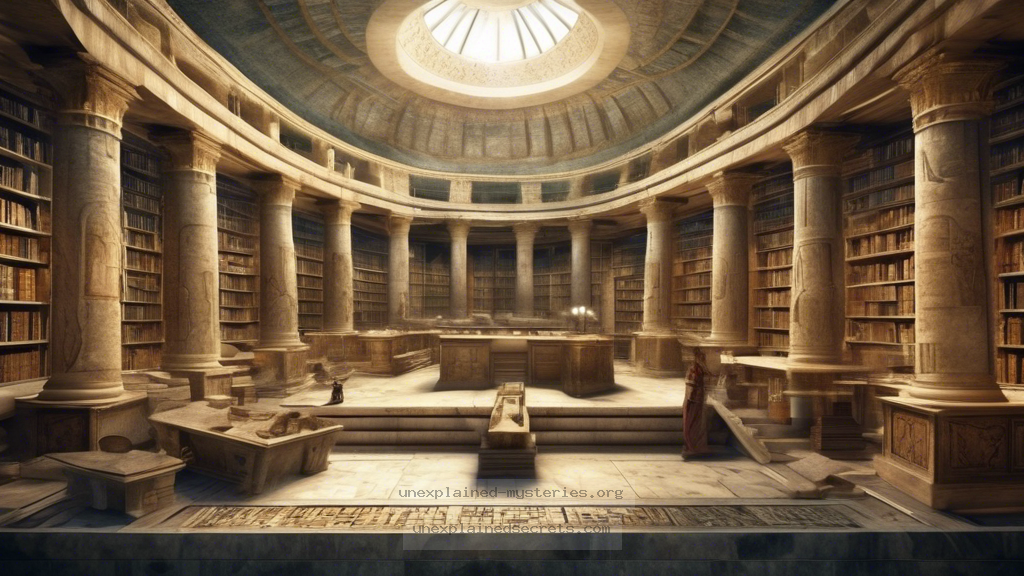What Happened to the Library of Alexandria: The Greatest Repository of Ancient Knowledge?
What Happened to the Library of Alexandria: The Greatest Repository of Ancient Knowledge?
The Library of Alexandria is often heralded as one of the most significant achievements of the ancient world, a bastion of knowledge that housed countless scrolls and texts from various cultures and eras. But what truly happened to this legendary library? Was its destruction a series of unfortunate events, or was there a more sinister agenda at play? This question matters not just because of its historical significance, but because it symbolizes the fragility of knowledge itself—a theme that resonates even today in our information-driven society.
Historical Context of the Library
The Library of Alexandria was established in the 3rd century BCE in Alexandria, Egypt, during the reign of Ptolemy I Soter. It was part of a larger institution known as the Mouseion, dedicated to the Muses, where scholars could gather, study, and exchange ideas. The library is estimated to have contained anywhere from 40,000 to 700,000 scrolls, making it the largest collection of texts in the ancient world.
Scholars from various backgrounds—Greek, Egyptian, Jewish, and Persian—contributed to its collection. The library was not just a storage space for texts; it was a vibrant center of learning that attracted intellectuals such as Euclid and Archimedes. Alexandria itself became a melting pot of cultures and ideas, setting the stage for advancements in science, mathematics, literature, and philosophy.
Theories Surrounding Its Destruction
The story of the library’s demise is shrouded in mystery, with several theories attempting to explain how it met its end. Some of the most prominent theories include:
- Fire During Julius Caesar’s Campaign (48 BCE): One of the most widely accepted theories suggests that a fire broke out during Julius Caesar’s siege of Alexandria, destroying a significant portion of the library’s collection. Caesar reportedly ordered the burning of enemy ships, which then spread to parts of the city, including the library.
- The Aurelian Campaign (270-275 CE): Another theory posits that the library suffered further damage during the Roman Emperor Aurelian’s campaign against Queen Zenobia of Palmyra. This conflict led to widespread destruction in Alexandria, potentially impacting the library.
- Religious Fanaticism (391 CE): Some historians argue that the rise of Christianity led to the library’s destruction as pagan texts were systematically destroyed. The decree by Theophilus, the Patriarch of Alexandria, to destroy pagan temples suggests a darker motive that may have extended to the library itself.
- Gradual Decline: Others propose that the library did not have a singular event leading to its demise but rather a gradual decline due to neglect and the shifting political landscape of the region.
Core Concepts of Ancient Libraries
To understand the significance of the Library of Alexandria, it’s essential to recognize the role of ancient libraries in preserving knowledge. Unlike today, where information is easily accessible, ancient libraries were critical in safeguarding texts that documented human history, culture, and intellect. The creation of libraries was often a reflection of a civilization’s values.
Libraries served as:
- Centers of Learning: They provided a space for scholars to gather, share ideas, and advance knowledge.
- Preservers of Culture: Libraries compiled texts that chronicled the achievements and beliefs of different civilizations.
- Tools for Governance: Rulers sometimes used libraries to legitimize their power by supporting scholarship and learning.
Practical Implications: What Was Lost?
The loss of the Library of Alexandria is often seen as an intellectual tragedy. The scrolls contained works on mathematics, astronomy, medicine, and philosophy that would have influenced future generations. For example, texts from mathematicians like Euclid and astronomers like Hipparchus could have accelerated the development of scientific thought.
Additionally, the loss extended beyond individual works; it represented the disappearance of a collective intellectual heritage. The library’s destruction is often cited as a contributor to the “Dark Ages,” a period characterized by a perceived regression in knowledge and culture in Europe following the fall of the Western Roman Empire.
Alternative Perspectives: The Library’s Mythos
While the Library of Alexandria is a symbol of lost knowledge, some scholars argue that its mythos has overshadowed the reality of ancient libraries. They contend that:
- Other Libraries Existed: Many ancient civilizations, including the Mesopotamians and the Chinese, had extensive libraries that were equally important but perhaps less celebrated.
- Knowledge Wasn’t Exclusively Lost: Some texts may have survived in other regions or were replicated elsewhere, indicating that knowledge was more resilient than often presumed.
This perspective encourages a broader understanding of how knowledge has been transmitted through history, emphasizing that the loss of one institution does not equate to the loss of all knowledge.
Common Misconceptions About the Library
There are several misconceptions about the Library of Alexandria that are worth clarifying:
- It Was a Single Building: Many believe the library was a singular physical location; however, it was part of a larger complex, the Mouseion, which encompassed various facilities for study and research.
- All Knowledge Was Lost: While the loss was significant, it is inaccurate to claim that all knowledge was obliterated. Many works were translated and preserved in other cultures.
Best Practices for Investigation or Study
For those interested in exploring the legacy of the Library of Alexandria and ancient knowledge more broadly, consider the following best practices:
- Engage with Primary Sources: Seek out original texts and translations to gain better insight into ancient thought.
- Study Comparative Literature: Examine other ancient libraries and their contributions to knowledge, such as the Library of Pergamum.
- Utilize Interdisciplinary Approaches: Combine history, archaeology, and literature studies to form a more comprehensive understanding of the era.
Future Developments and Ongoing Research
Interest in the Library of Alexandria has not waned; ongoing research continues to shed light on its legacy. Archaeological excavations in Alexandria may uncover remnants of the library or related sites, while advancements in technology allow for the digital reconstruction of texts that may have been lost. This intersection of technology and history offers hope for rediscovering aspects of ancient knowledge.
Moreover, modern libraries and institutions are beginning to embrace the idea of open access, echoing the spirit of the Library of Alexandria as a place where knowledge is freely shared. Initiatives to digitize ancient texts and make them available online reflect this ongoing commitment to preserving and sharing knowledge for future generations.
Conclusion: The Enduring Legacy of the Library of Alexandria
While the fate of the Library of Alexandria may never be completely understood, its legacy endures as a powerful reminder of the importance of knowledge and the fragility of cultural heritage. Through continued research and exploration, we may yet uncover more about this monumental institution and its role in shaping the intellectual landscape of the ancient world.
As we reflect on the lessons learned from the Library of Alexandria, we are reminded of our responsibility to safeguard knowledge in our own time. The quest for understanding is a shared human endeavor, and preserving the past is essential for the future. ✅
Other Articles
Recent Posts
- What Happened to Flight MH370? The Conspiracy Theories That Still Haunt Us
- What Secrets Lurk Within the Walls of the Infamous Trans-Allegheny Lunatic Asylum?
- What Evidence Supports the Existence of Bigfoot in the Pacific Northwest?
- What Happened to the Indus Valley Civilization? Unraveling the Mysteries of Ancient Urban Life
- Can Telepathy Be Scientifically Proven Through Laboratory Evidence?







